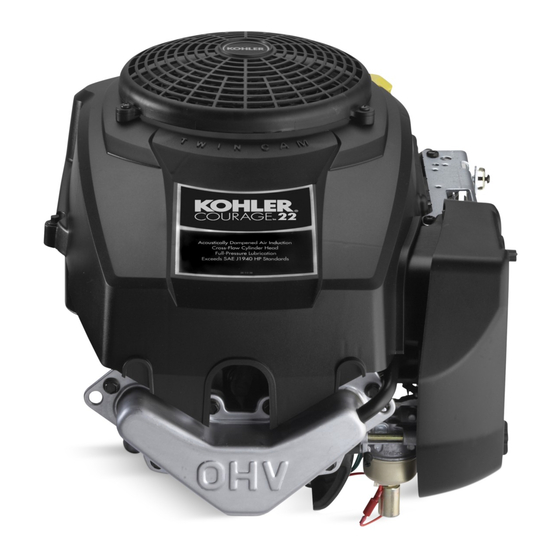Kohler Courage SV540 Manual del usuario - Página 6
Navegue en línea o descargue pdf Manual del usuario para Motor Kohler Courage SV540. Kohler Courage SV540 17 páginas. Vertical shaft
También para Kohler Courage SV540: Manual del usuario (17 páginas), Manual del usuario (17 páginas), Manual del usuario (8 páginas), Manual del usuario (48 páginas)

Specifications
Model: ............................................................. SV470 ................ SV480 ................ SV530 ................ SV540
Bore: ................................. mm (in.) ............. 94 (3.7) ............... 94 (3.7) ............... 94 (3.7) ............... 94 (3.7)
Stroke: ............................. mm (in.) ............. 86 (3.4) ............... 86 (3.4) ............... 86 (3.4) ............... 86 (3.4)
Displacement: .............. cc (cu. in.) ............. 597 (36.4) ........... 597 (36.4) ........... 597 (36.4) ........... 597 (36.4)
Power (at 3600 RPM): .. kW (HP) ............. 11.2 (15*) ........... 11.9 (16*) ........... 12.7 (17*) ........... 13.4 (18*)
Compression Ratio: ..................................... 8.5:1 .................... 8.5:1 .................... 8.5:1 .................... 8.5:1
Weight: ................................ kg (lb.) ............. 35.8 (79) ............. 35.8 (79) ............. 35.8 (79) ............. 35.8 (79)
Oil Capacity w/filter: L (U.S. qt.) ............. 1.5 (1.6) .............. 1.5 (1.6) .............. 1.5 (1.6) .............. 1.5 (1.6)
Lubrication: .................................................. ---------------- Full Pressure w/Full Flow Filter --------------
Model: ............................................................. SV590 ................ SV600 ................ SV610 ................ SV620
Bore: ................................. mm (in.) ............. 94 (3.7) ............... 94 (3.7) ............... 94 (3.7) ............... 94 (3.7)
Stroke: ............................. mm (in.) ............. 86 (3.4) ............... 86 (3.4) ............... 86 (3.4) ............... 86 (3.4)
Displacement: .............. cc (cu. in.) ............. 597 (36.4) ........... 597 (36.4) ........... 597 (36.4) ........... 597 (36.4)
Power (at 3600 RPM): .. kW (HP) ............. 14.2 (19*) ........... 14.9 (20*) ........... 15.7 (21*) ........... 16.4 (22*)
Compression Ratio: ..................................... 8.5:1 .................... 8.5:1 .................... 8.5:1 .................... 8.5:1
Weight: ................................ kg (lb.) ............. 35.8 (79) ............. 35.8 (79) ............. 35.8 (79) ............. 35.8 (79)
Oil Capacity w/filter: L (U.S. qt.) ............. 1.5 (1.6) .............. 1.5 (1.6) .............. 1.5 (1.6) .............. 1.5 (1.6)
Lubrication: .................................................. ---------------- Full Pressure w/Full Flow Filter --------------
*Horsepower ratings exceed Society of Automotive Engineers Small Engine Test Code J1940. Actual engine
horsepower is lower and affected by, but not limited to, accessories (air cleaner, exhaust, charging, cooling, fuel
pump, etc.), application, engine speed and ambient operating conditions (temperature, humidity, and altitude).
Kohler reserves the right to change product specifications, designs and equipment without notice and without
incurring obligation.
Pre-Start Checklist
• Check oil level. Add oil if low. Do not overfill.
• Check fuel level. Add fuel if low.
• Check cooling air intake areas and external
surfaces of engine. Make sure they are clean and
unobstructed.
• Check that the air cleaner components and all
shrouds, equipment covers, and guards are in
place and securely fastened.
• Check that any clutches or transmissions are
disengaged or placed in neutral. This is especially
important on equipment with hydrostatic drive.
The shift lever must be exactly in neutral to
prevent resistance which could keep the engine
from starting.
WARNING: Lethal Exhaust Gases!
Engine exhaust gases contain poisonous carbon monoxide.
Carbon monoxide is odorless, colorless, and can cause death if
inhaled. Avoid inhaling exhaust fumes, and never run the
engine in a closed building or confined area.
Cold Weather Starting Hints
1. Be sure to use the proper oil for the temperature
expected. See Figure 2 on page 4.
2. Declutch all possible external loads.
6
Operating Instructions
Also read the operating instructions of the equipment this engine powers.
3. A warm battery has much more starting
capacity than a cold battery.
4. Use fresh winter grade fuel. NOTE: Winter grade
gasoline has higher volatility to improve
starting. Do not use gasoline left over from
summer.
Starting
1. a. For a Single-Lever Throttle/Choke Control:
Place the lever into fast/choke on position.
See Figure 5.
b. For Separate Levers: Place the throttle
control midway between the slow and
fast positions. Place the choke control into
the on position.
Figure 5. Throttle Position for Starting Engine with
Single-Lever Control.
